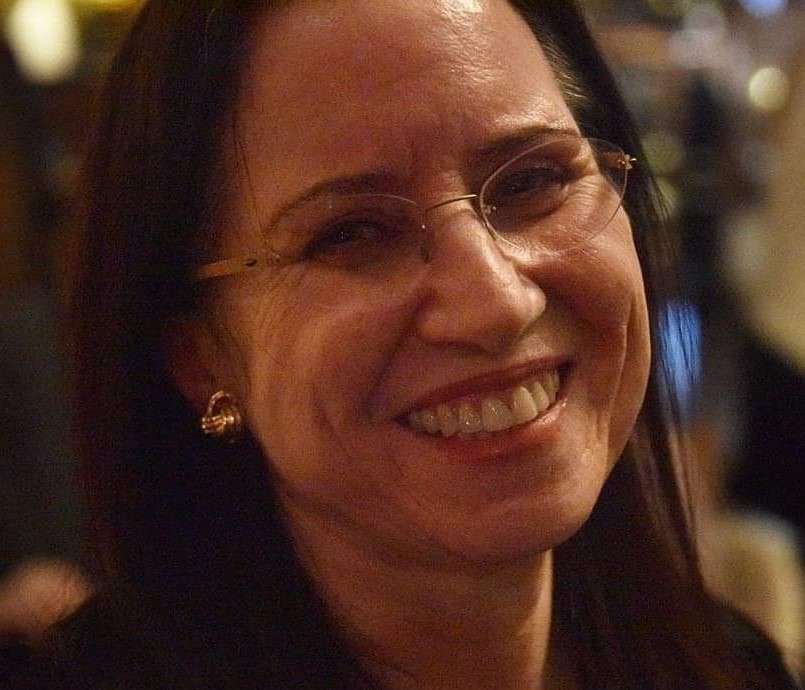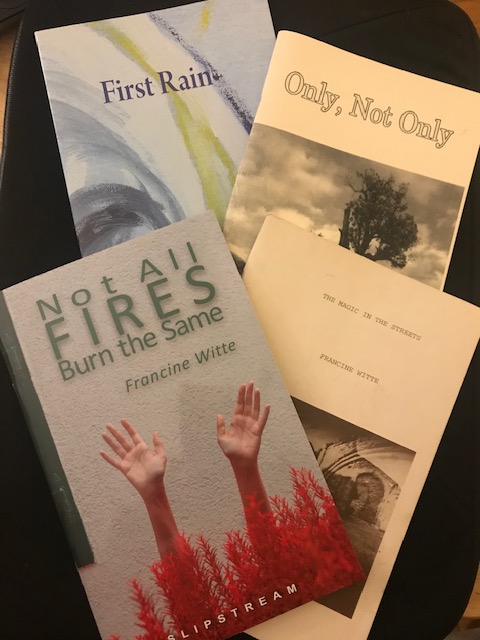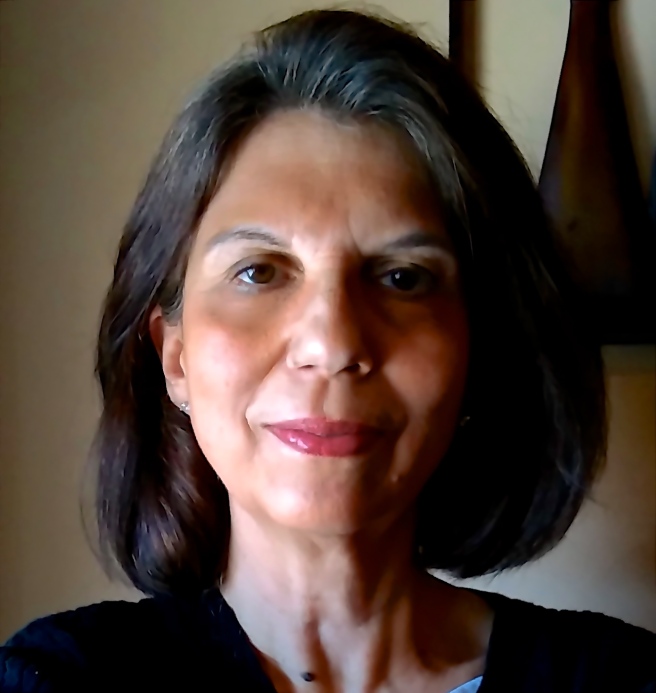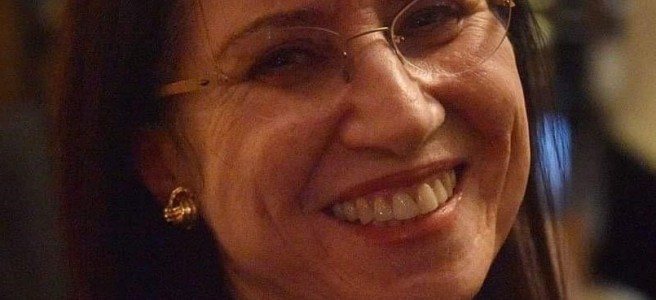Interview with Arya F. Jenkins
Francine Witte has published four poetry chapbooks, among many other accomplishments. The Poetry Cafe introduces Witte in conversation with poet and writer Arya F. Jenkins, who joins our guest reviewers with this interview.
I’ve always thought that it’s the small details that connect the writer to the reader. –Francine Witte
Arya F. Jenkins: You write poetry, flash and fiction. As a poet, you have authored several poetry chapbooks and a couple of full-length poetry collections. How did you come to be a poet?
Francine Witte: I started writing poetry in second grade. Rewriting song lyrics. And then when I was about 13, I started writing poetry for real. It was about playing with words and expressing ideas. I’ve always enjoyed language and writing.
AFJ: Your ability to write about lost love, grief, and aging with such particularity and universality is a rare gift. Are you sometimes surprised at the level of honesty and truth your poems are able to plumb?
FW: I’ve always thought that it’s the small details that connect the writer to the reader. Everyone has experienced love, grief, and on some level, the discomfort of getting older (I never have felt as old as the day I turned 20, by the way.) It’s the focus of a tiny detail that either makes the reader say, “yes, that happened to me,” or “oh yes, I can see what you mean.” Finding these small moments is actually one of the most fun parts of writing for me.
AFJ: Are your chapbooks held together by certain themes? If so, what are they?
FW: My chapbooks seem to be unintentionally themed as a result of what I was writing about at that particular time. For example, in First Rain, I have a good amount of the poems focusing on child/parent relationships, while Only, Not Only, deals more with a grown narrator who has been hurt by romantic love. And the theme of Not All Fires Burn the Same, is really more or less a collection of mother/daughter, love gone wrong and environment.
AFJ: How has your relationship to the big themes of love and loss in your writing changed over the years? Have you abandoned any topics? If so, which? And why?
I’m still pretty focused on love and loss. I don’t see that changing.
FW: I’m still pretty focused on love and loss. I don’t see that changing. I am also fascinated by the theme of people and their history on this planet. I’ve always been interested in weather and the natural world. In Theory of Flesh, I find myself looking back to cave people and thinking that they were the same as us in terms of their basic emotional makeup.
AFJ: I am intrigued by your deconstruction of “self” in some of your poems. In your collection, The Theory of Flesh, the narrator asks who the poet is and how she can be distinguished from the other selves that inhabit her daily life? Does this focus have precedence in your chapbooks?
FW: I think you are referring to my poem “How Many Me’s are There?” which talks about the different people we are in different situations. It asks the question of the me’s occurring at the same time in a person’s life. But there are also different me’s that span time. There’s childhood me, grown-up me, married me, etc. I do think my chapbooks reflect these different times in the speaker’s life.
AFJ: Lately I’ve encountered artists and poets who revere animals, the dog especially, and have done beautiful justice to them in their work. Some of the poems in your full-length collection, The Theory of Flesh examine links between the animal and human kingdoms. What do animals have to teach humans? How do they “speak to” what is higher in us?
FW: Animals seem to live in the moment. They go on instinct and need. They don’t seem to have hidden agendas. They love the person who feeds them. They are grateful for that. Simple. That’s what we can learn from them.
They speak to the need in us to be needed, to care for someone else. That part, the part that cares beyond our own comfort, really is our higher self.
AFJ: Do you feel you have any obligations as a poet? If so, to what or whom?
FW: My obligation as a poet is to give the reader or listener a great experience for having taken the time to read or listen to my poem. I need to say something that the reader has never heard in a way they have never heard it. I have to create something, make them feel something, or at least make their few minutes of reading worthwhile. That’s my obligation.
AFJ: What if anything would you like to impart to those poets new to poetry who would like to publish a chapbook?
When putting together a chapbook, or any book, make sure
every poem is a 10.
FW: I would tell all poets to become your own best editor and listen to that voice that tells you a line or a stanza isn’t as good as it could be, or to take it out, etc.
When putting together a chapbook, or any book, make sure every poem is a 10 (at least in your opinion.) There is no room for filler even if it’s on theme. I think the quality of the poems is more important than any superimposed connective tissue.

Francine Witte is the author of four poetry chapbooks and two full-length collections, Café Crazy and The Theory of Flesh from Kelsay Books. Her flash fiction has appeared in numerous journals and anthologized in the most recent New Micro (W.W. Norton) Her novella-in-flash, The Way of the Wind has just been published by Ad Hoc Fiction, and her full-length collection of flash fiction, Dressed All Wrong for This was recently published by Blue Light Press. She lives in New York City.

The Magic in the Streets (Owl Creek Press, 1994) first prize contest winner
First Rain (Pecan Grove Press, 2009) First prize contest winner
Only, Not Only (Finishing Line Press, 2012)
Not All Fires Burn the Same (Slipstream Press, 2016) first prize contest winner

Arya F. Jenkins is a Colombian-American poet and writer whose work has been published in numerous journals and zines, most recently, IO Literary Journal, Rag-Queen Periodical, and The Ekphrastic Review. Her poetry and fiction have been nominated for the Pushcart Prize. Poetry is forthcoming in Poetica Review. Her poetry chapbooks are: Jewel Fire (AllBook Books, 2011), Silence Has A Name (Finishing Line Press, 2016), and Love & Poison (Prolific Press, 2019). Her short story collection Blue Songs in an Open Key (Fomite Press, 2018) is available here: www.aryafjenkins.com.
Risa Denenberg is the curator at The Poetry Cafe.
She is a co-founder and editor at Headmistress Press and has published three
full length collections of poetry, most recently, “slight faith” (MoonPath Press, 2018).


Good interview.
LikeLike